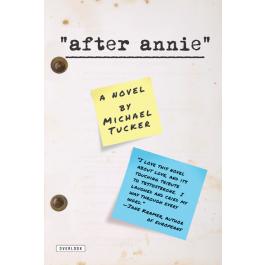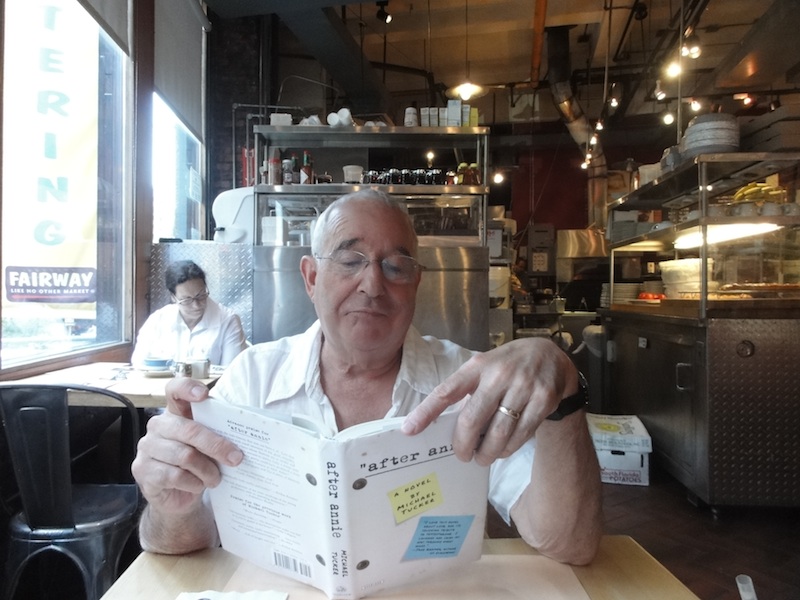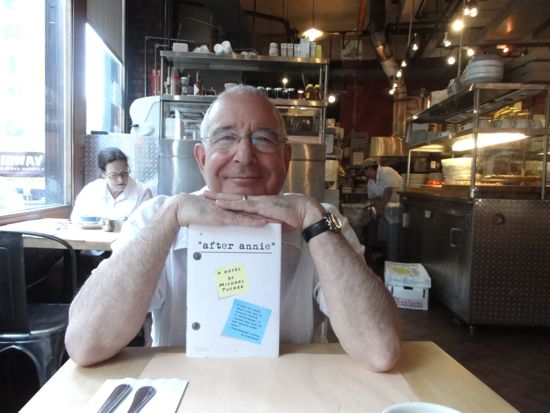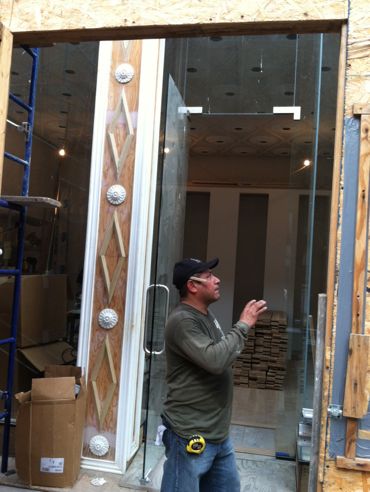Editor’s Note: Nancy Novick reviewed Michael Tucker’s new book “After Annie”, and also got a chance to meet and interview him at the Fairway Cafe. Both the review and the Q&A are below.
By Nancy Novick
Life in any New York City neighborhood has its share of aggravations, but for Upper West Sider Herbie Aaron, who is already coping with his wife’s terminal cancer diagnosis, a run-in with a cell-phone wielding, traffic-blocking shopper at Fairway feels like the last straw. What Upper West Sider wouldn’t sympathize?
Herbie imagines the verbal skewering he would like to give the woman as he walks home up West End Avenue, but he’s got much bigger concerns. How will he survive emotionally after his wife’s death? Can he get closer to the daughter to whom he has had a prickly relationship at best? Can he find purpose in a life in which he is no longer part of a couple?
Herbie’s story as told in After Annie (Overlook Press), a new novel by author and actor Michael Tucker, is based in part on true-life experience. Tucker’s wife, actress Jill Eikenberry, was diagnosed with her first episode of breast cancer in the 1980s; her doctor found a recurrence a few years ago. Happily, Eikenberry is alive and well and continues to act with her husband and on her own. But this chapter in the couple’s lives prompted Tucker to start thinking about a “what if” scenario.
Tucker’s Herbie Aaron is complex and real, a man contemplating, and then coping with, the loss of the love of his life. (As with the Tucker-Eikenberry alliance, Herbie and his wife are actors, professional as well as romantic partners.) Grief doesn’t make Herbie a better person— he drinks too much, he lusts after other women, and lashes out at others and himself. He is also calculating and entertainingly self-aware of his effect on women—he is a charmer. And perhaps with everyone except Annie there is always a bit of the actor in him. On meeting Olive, a beautiful young bartender Herbie “half drains [his] glass and then gives her his sad, wise empathetic look—a look that he has down cold.”
 Herbie’s identity as a man who loves women and sex—in fact there seems little doubt that he cannot get by without a woman in his life—informs the entire novel, but he is far from a one-note character. Through his role as mentor to Olive we are given an insider’s perspective to life in the theater and what it’s like for actors who spend weeks together in rehearsal. His observations about Bob, a minor character cast in the role of Chekov’s Uncle Vanya, takes us through the peculiar and unsettling process of inhabiting a character. Herbie’s friendship with Billie, a gay woman who has also recently lost her partner to cancer, allows us to see Herbie’s capacity for friendship with a woman who is not a potential lover. And his interactions with his daughter, Candy, and his contemplations about fatherhood show a side of Herbie we may not necessarily like, but can’t help find intriguing.
Herbie’s identity as a man who loves women and sex—in fact there seems little doubt that he cannot get by without a woman in his life—informs the entire novel, but he is far from a one-note character. Through his role as mentor to Olive we are given an insider’s perspective to life in the theater and what it’s like for actors who spend weeks together in rehearsal. His observations about Bob, a minor character cast in the role of Chekov’s Uncle Vanya, takes us through the peculiar and unsettling process of inhabiting a character. Herbie’s friendship with Billie, a gay woman who has also recently lost her partner to cancer, allows us to see Herbie’s capacity for friendship with a woman who is not a potential lover. And his interactions with his daughter, Candy, and his contemplations about fatherhood show a side of Herbie we may not necessarily like, but can’t help find intriguing.
While the story is clearly Herbie’s, we are given an opportunity to know Annie, too. She is reconciled to dying and wants “to fix everyone one last time” before she goes. Although she has a loving relationship with her daughter, Annie’s death may actually be the catalyst Candy needs to come into her own. We also learn that the marriage has been full of sexual experimentation, spiritual seeking, and the occasional infidelity by both partners. Ultimately, depending on your point of view, Annie, with her talent for friendship and sexual selflessness—she gives Herbie her blessing to continue enjoying other women after she is gone— is either a husband’s fantasy or just an exceptionally loving and evolved human being.
One of the pleasures of After Annie is the restraint Tucker’s exercises in tying up the threads of the novel. As Herbie works to create a new life without Annie, there are sexual encounters with the wrong person, excessive drinking and misunderstandings. Indeed, it seems unlikely that Herbie will ever have a love as meaningful as the one he had with Annie. Grieving, like all of life, including trips to Fairway, can be a messy business. But Tucker also reassures us —along with the false steps and heartache, there will still be satisfying meals, good sex, and maybe even an intriguing acting role or two.
Michael Tucker, who may be best known for his long-time role on television as Stuart Markowitz in LA Law (Jill played his TV wife, Ann Kelsey) has a long list of stage and screen credits—among them a touching performance as the father in Woody Allen’s Radio Days and Bagel in Barry Levinson’s Diner and Tin Men. Tucker has also published three works of nonfiction about food and family. After Annie marks his debut as a novelist.
Interview:
It’s Thursday morning and Michael Tucker arrives at the restaurant over Fairway right on time. Dressed all in white, he looks relaxed and friendly in spite of the busy day ahead of him, helping his mother-in-law move into an assisted living facility and participating in a discussion of his latest book at an event at the Screen Actor’s Guild Foundation.
Tucker is currently at work on a play—his first—a project he’ll be pursuing over the summer at the vacation home in Italy that he shares with wife Jill Eikenberry. But today we’re talking about his novel, After Annie; writing versus acting; and life on the Upper West Side. (The Q&A that follows has been lightly edited for clarity.)
West Side Rag: So when you’re not in Italy, you and your wife are Upper West Siders. I guess I thought you were California-based because of LA Law.
Michael Tucker: We were New Yorkers first and then we went to Los Angeles through LA Law and stayed for nine years. Then we moved to Northern California for nine years and during that time we bought the house in Italy. It’s very remote, in the middle of olive groves as far as you can see. So we were living in two vacation places, but there was no place we could seek acting work. Then Jill got a play in New York and we used that as an excuse to move back and we’re very happy we did.
 WSR: Your main character in After Annie, is another actor who lives on the Upper West Side, Herbie Aaron. He’s often recognized for a role he played a long time ago. He’s not always happy about that association. How close is Herbie to you?
WSR: Your main character in After Annie, is another actor who lives on the Upper West Side, Herbie Aaron. He’s often recognized for a role he played a long time ago. He’s not always happy about that association. How close is Herbie to you?
MT: There are a lot of differences. I think he’s a kind of alter ego. I aspire to be Herbie. He’s purer than I am. He has ethics and integrity, and I have no integrity (laughs). It was wonderful to be able to speak through him. His lets his anger come out and [expresses] opinions I would couch six ways from Sunday. It’s very freeing to speak through his voice. As far as being recognized for LA Law. I’m not angry about it. People who recognize us these days are sweet. Herbie doesn’t want to be seen by anybody. As he says at one point, if he could put a coat over his head, he’d do that. He doesn’t know who he is. Two-thirds of him has been cut away.
WSR: It turns out he’s a teacher?
MT: Yeah. Well Annie knew that to save his life he needed a mentee.
WSR: He’s such an appreciator of women. Does Herbie need a woman in his life?
MT: Yes. And no one knew that better than Annie.
WSR: The parts of your book that focus on acting sounded true to me, although I have no experience as an actor.
MT: People in the business say that it comes very close to the real thing. As far as Olive and her transformation into a good actress go, well it depends how good she was to begin with. If she was just a neophyte, it would be a little bit of stretch to think she would do that well that quickly. But she had performance chops and she was just underselling herself until she met Annie and she decided not to do that anymore.
WSR: Annie is a powerful character.
MT: I think so too. Annie’s kind of mythic. People say well Annie is Jill. And she is, in my mind. But Jill is still human. Annie has reached the top of the mountain.
WSR: Did you show Jill your manuscript as you were writing it?
MT: I waited until I got up to the point in Chapter 4 when Annie dies until I showed her what I was doing. It was a very strange time. It started with Jill’s having a recurrence of her breast cancer after 23 years. And it turned out to be the best possible scenario, it was small, they got it very quickly, they got it out, no chemo necessary. She’s in great shape, and everything’s fine. But the word recurrence was really hard to hear. Almost everyone we knew with a recurrence died. I went inside and started spinning this what if, what if, what if, and that’s the way the book started. When she read the manuscript, she told me to go for it. She’s been very supportive, but she does show up to every book event and waves and says “Still here…”
WSR: You and Jill often speak to groups about breast cancer. What do you tell them?
MT: Our message is about early detection. And every time we give the talk we are also reminded how important it is to come to grips with your mortality honestly …it affords you the opportunity to live a great life. The Irish call it the sting of death—if you can live with the sting of death, it sharpens everything. Our life has been like that for the last 26 years since Jill first had cancer and it’s great. Unfortunately, most of us need to be hit with a bad experience to have that kind of awareness.
WSR: As far as what’s important in your life now, which do you prefer, writing or acting?
MT: Writing. I’m drifting away from acting. I do it when [I] can find good roles [that aren’t long-term commitments.] Jill and I are going to do a play later this summer up in Stockbridge, Massachusetts, called Brace Yourself by David Epstein. But I’m really taken with writing, which I do every day. The play is very much on the burner right now. I also write my blog every week: www.notesfromtheculinarywasteland.com. It’s mostly about the food I’m eating wherever I am, whether it’s on the Upper West Side or Italy, and things that bother me, like waiters who ask me if I’m “still working on that?”
WSR: Who do you like to read?
MT: I read almost everything. I’m stocking up for the summer and plan to read Hilary Mantel’s new book, Bring Up the Bodies. I also like Elmore Leonard and I’ve been reading a lot of short stories, because I’m interested in that form. I’ve written a couple of short stories that have never been published. Jill and I will be reading them as part of an evening of my writing called “Mike’s Shorts” at the Cape May Stage at the end of August.
WSR: Getting back to the neighborhood, do you have any favorite places to eat or shop?
MT: I love the Upper West Side and its becoming a good restaurant neighborhood. We tend to cook at home a lot because Jill is mostly vegan. I love this place (Fairway) although it’s a love-hate relationship. I write a lot about it in my blog. And I love Zabar’s, it’s my local bodega–which isn’t bad. I also like to shop at Eataly, which is great for produce. I think as New Yorkers we have to pay too much for fresh food. In Italy, fresh food is affordable for everyone.
Interested in seeing Michael Tucker and Jill Eikenberry perform this summer?
Brace Yourself will run at the Stockbridge Theater from August 14-August 25. https://www.berkshiretheatregroup.org/events/main-stage-stockbridge/219-brace-yourself.html
Mike’s Shorts will take place at the Cape May Stage on August 27
https://www.capemaystage.com/second-stage-series-events.html#August
Want to read more of Michael Tucker’s work? In addition to After Annie, he has published:
I Never Forget a Meal: An Indulgent Reminiscence
Living in a Foreign Language: A Memoir of Food, Wine, and Love in Italy, and
Family Meals: Coming Together to Care for an Aging Parent
Photos by Nancy Novick. She blogs about books, bookstores, and libraries at www.Stacked-NYC.com.










Very engaging interview. Good photos. His book certainly sounds based on his own marriage and career with insights into theater life and the New York no-longer-young dating scene. Worth a look.
You both spoke at our YiddishClub in Greenbriar at Whittingham in Monroe Township, nj. About two years ago. Would you be interested in discussing your new book at one of our meetings in 2014